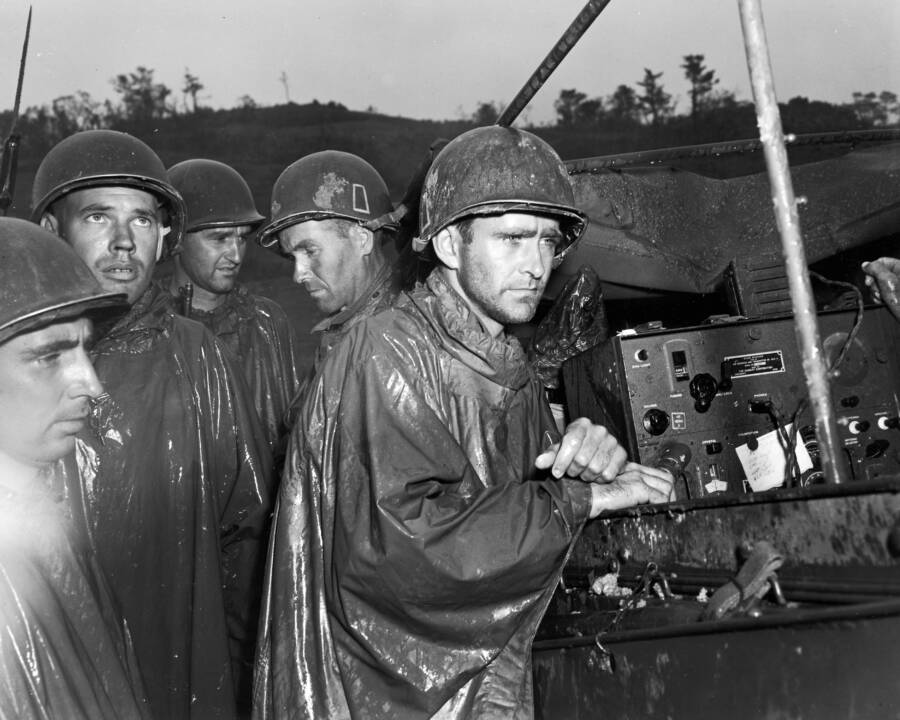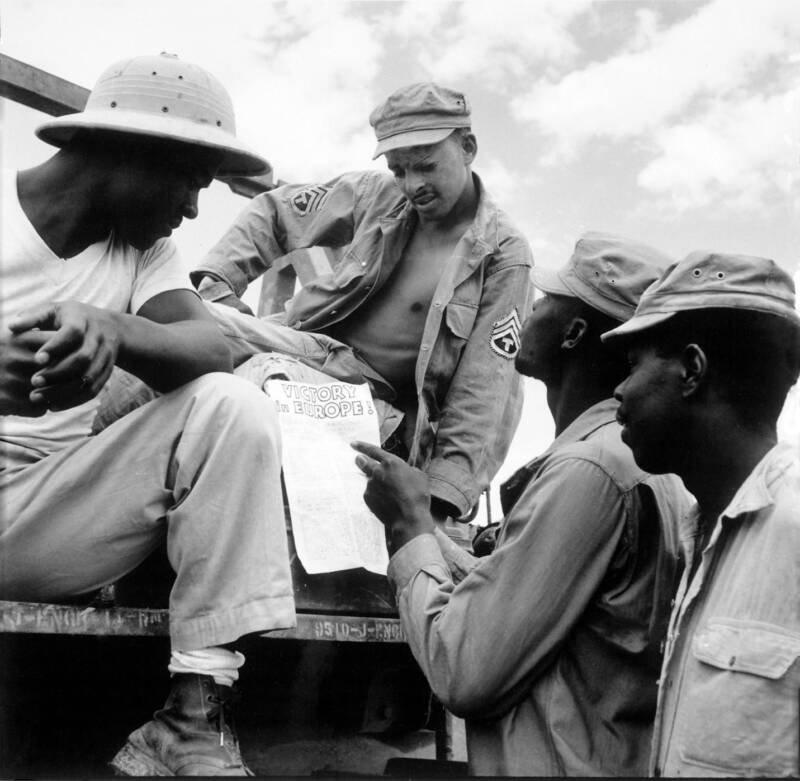 |
| American soldiers on Okinawa in Japan
listening to the radio broadcast announcing the German surrender and the official end of World War II in Europe. The Battle of Okinawa began in April 1945 and lasted until June, and Japan would not officially surrender until September. (All That's Interesting) |
As Barack Obama heads to Hiroshima, here is an
excerpt from a compilation of Hiroshima writings:
A shortened version of the following text appeared in
the International Herald Tribune of January 9, 1998.
In what is perhaps a laudable attempt to declare that underneath the skin, all humans are basically the same (i.e., equally racist), one of your readers compares the World War II ravages of the Japanese and German armies to the massacre at My Lai. Widespread references to "gooks" notwithstanding, the revelation that more than 300 villagers had been killed in one day in Vietnam by fellow Americans immediately brought about uproar, self-questioning, and opposition in U.S. society, not least in military circles which soundly condemned the massacre. In comparison, the few attempts in the past 60 years to simply present the Japanese nation with a straightforward account of its army's involvement in the slaughter of 300,000 civilians at Nanking and other atrocities have been met with wholesale resistance.
Another reader coyly suggests that because they produced the same number of dead, the rape of Nanking is no less racist than the atom bombing of Hiroshima and Nagasaki. He overlooks a fundamental difference. The atom bombs did not appear out of the blue, but after years of gruelling fighting, suffering, and dying at the hands of the fanatical armies of the society which passively allowed its soldiers to slaughter civilians, work prisoners of war to death, and otherwise inflict the most cruel atrocities known to modern man.
Unlike the majority of wars which flicker out when the outcome becomes obvious, World War II in the Pacific grew increasingly bloody as U.S. forces approached the Japanese homeland. For instance, the battle for Okinawa, the costliest battle for the Americans — and one of the costliest as well for the Japanese — did not end until June 21, 1945, i.e., after the Germans' surrender in the European theater. The prospect of ever-increasing numbers of dead soldiers, and not racism, was the decisive element in deciding the use of the atomic bombs six weeks later.
In comparison, the Japanese had encountered little effective resistance and few losses in their 1930s occupation of China, and again, at any point during the two-week rape of Nanking, some commander (not least the Emperor) could have stepped in and said "Enough".
 |
| American troops in Burma (now Myanmar) taking a break to read about the Allied victory over Nazi Germany. (All That's Interesting) |
Related:
• Hiroshima 15: Examining the Issues Surrounding the Dropping of Atomic Bombs on Japan (Erik Svane)
• Hiroshima 14: "I regard Hiroshima revisionism as the greatest hoax in American history" (Robert Maddox)
• Hiroshima 13: Although It Is Not Said Openly, Hiroshima Also Played a Purifying Role, IE the Baptism of a New Japan, the Event that Put an End to 50 Years of Crimes (Le Monde)
• Hiroshima 12: Political Correctness in Japan: The comment "tramples on the feelings of victims", so… Shut the F**k Up and Lose Your Job! (re the forced resignation of Japan's defense (!) minister)
• Hiroshima 11: If Western elites cannot find perfection in history, they see no good at all; most never learned the narrative of WW II, only what was wrong about it (Victor Davis Hanson)
• Hiroshima 10: If Not for the Atom Bombs, Japan, as we know it today, would not exist (S L Sanger, author of “Working on the Bomb”)
• Hiroshima 9: Over one million warning leaflets were dropped over Hiroshima, Nagasaki, and 33 other Japanese cities 5 days before the Hiroshima bombing (Bill Whittle)
• Hiroshima 8: Was It Wrong to Use the Atom Bomb on Japan? (Father Wilson Miscamble)
• Hiroshima 7: Some Facts About Hiroshima and World War II That You Hear Neither From America's MSM, University Élites, and History Books, Nor From Japan's (New York Times)
• Hiroshima 6: "Lance or spear practice was a regular women's exercise to practice for the anticipated U.S. landing" (a Japanese American)
• Hiroshima 5: Japan's plans for defense involved mobilizing the civilian population, including women and children, for the customary suicidal battle tactics (Thomas Sowell)
• Hiroshima 4: "Les 300 000 morts d'Hiroshima ont épargné bien davantage de Japonais, qui auraient été écrasés sous des bombes ordinaires" (Charles de Gaulle)
• Hiroshima 3: A mainland invasion could have resulted in millions of Japanese deaths—and that's not counting civilians (Wall Street Journal)
• Hiroshima 2: Hand-wringing over Hiroshima is just virtue-signaling by people who never said a bad word about Stalin or Mao’s mass murders (Glenn Reynolds)
• Hiroshima 1: Unlike the ends of the majority of conflicts, World War II in the Pacific grew increasingly bloody as U.S. forces approached the Japanese homeland (Erik Svane)
